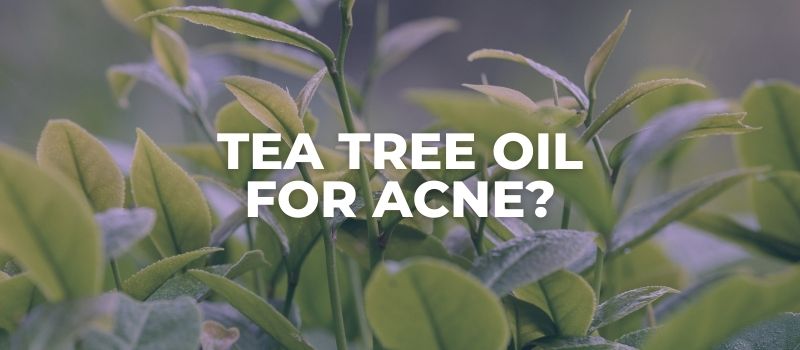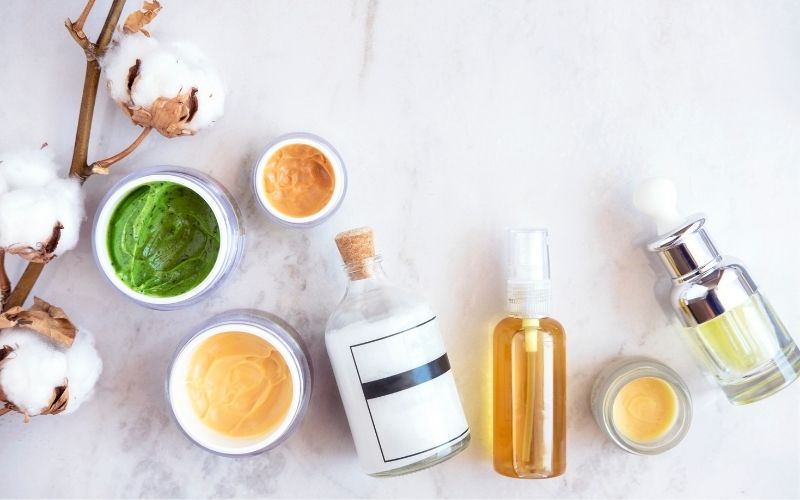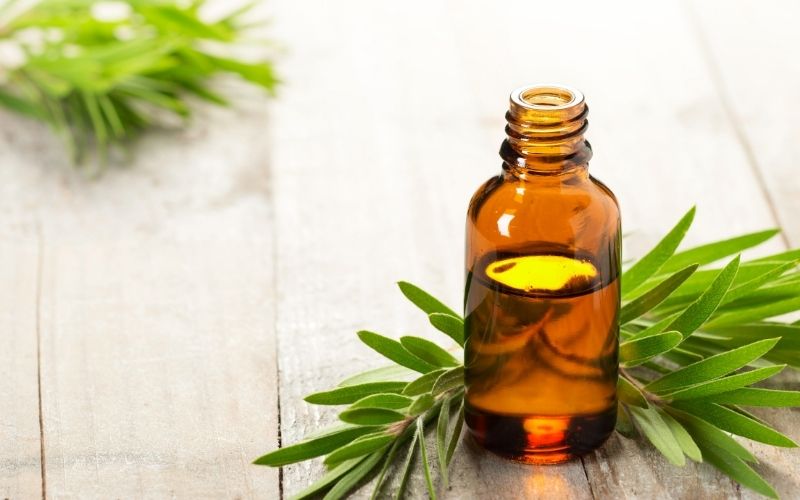Tea tree oil is often used in complementary and alternative medicine to treat conditions such as athlete’s foot, lice, nail fungus, cuts, mite infection, insect bites, and acne. However…
While yes, you can use tea tree oil for mild to moderate acne, this doesn’t come without its own risks, much like any other ingredient in a skincare product.
Tea tree oil can potentially calm redness and inflammation, which will result in soothing acne lesions, however, it’s not safe to be used by everyone, and it can, in some cases, exacerbate the inflammation and thus prolong the healing process.
Therefore, in this article, I will discuss the effects of tea tree oil acne and on the skin, as well as give you my opinion on whether you should use this ingredient or opt for something else instead.

Is Tea Tree Oil Good For Acne?
Tea tree oil is an essential oil that contains certain components that can potentially soothe inflammation and reduce acne lesions.
However, tea tree oil is not necessarily good for acne because there is the potential for allergic reactions or irritation from other components that are less friendly towards the human skin.
Tea tree oil is steam-distilled from the Australian native plant, Melaleuca alternifolia, a name you will most likely find on the ingredient list in products containing tea tree oil.
Tea tree oil has been reported to have broad-spectrum antibacterial and anti-inflammatory properties against bacterial, viral, fungal, and protozoal infections affecting the skin and mucosa.
This is due to the high content of a component known as Terpinen-4-ol, which has been linked with antimicrobial and antifungal activity in in-vitro studies (on cells in a petri dish).
This essential oil has been used for almost 100 years in Australia after Australian chemist Arthur Penfold first reported the medicinal properties in the 1920s.
Penfold’s report served as a part of a larger survey into Australian essential oils, and it had a good economic potential for the country.
Australians went so hard selling the beneficial effects of the tea tree oil to the point where legends say soldiers in World War II were given vials of tea tree oil in their survival kits to help them disinfect and heal their wounds.
But all that aside, what does modern research say? Well, not much, apparently.
A small amount of research has been done on topical use (applying to the skin) of tea tree oil for people’s health conditions.
For instance, there have been only a few small studies in humans on each of the following conditions:
- acne
- lice
- athlete’s foot
- nail fungus, and
- mite infection at the eyelids base.
There have been no studies in humans on the use of tea tree oil for insect bites, but some people swear by its efficacy in soothing rashes and irritations caused by insect bites.
But these trials are very limited, and the two I managed to find online included no more than 30 people.
One of these trials indicates that tea tree oil might be helpful for acne.
This particular trial was done by prescribing 5% water-based tea tree oil gel and 5% water-based benzoyl peroxide lotion to two groups of subjects that had mild to moderate acne.
Both groups showed improvement with both treatments; however, the group using benzoyl peroxide had superior results, but they also reported more irritation from using the treatment.
On the other hand, the group that used tea tree oil had less significant improvements, but they experienced less irritation than the group using benzoyl peroxide.
Additionally, one small study suggests that tea tree oil might help with nail fungus as it showed effectiveness in inhibiting fungal growth.
But overall, the research is insufficient to allow clear conclusions to be reached about the use of tea tree oil for these conditions.
Furthermore, some early research shows that tea tree oil might be promising for treating mite infections at the eyelids base (also called ocular demodicosis).
The current evidence is insufficient for a clear conclusion, and the potential of eye irritation is tremendous; therefore, it’s highly not recommended that you use tea tree oil to resolve this sort of issue in this delicate area.
All in all, there is no compelling evidence to show that tea tree oil is efficient in helping more severe dermatological conditions, such as severe acne, for example.
But, it did show promising results; however, more research needs to be done for any substantial evidence.
Aside from this, I have personally used a few products that contain tea tree oil. I didn’t experience any improvement in my acne; however, these were good products that I wouldn’t mind using again.
One of my favorite cleansers is the COSRX Low pH Good Morning Gel Cleanser that contains tea tree oil. It’s not dehydrating to the skin, and it didn’t cause any irritations on my sensitive skin.
Another product I like is the COSRX Oil-Free Ultra-Moisturizing Lotion with Birch Sap.
Again, this didn’t help my acne; however, it didn’t make my skin any worse than it was, so I can say that it’s not a bad product.
Other than that, although I think tea tree oil is not all that bad for acne, I would suggest that you stay away from doing the following:
- don’t use tea tree oil that’s bought from Amazon and intended to be used in a humidifier or an oil burner as these are usually highly concentrated and can burn your skin
- don’t use anything that has transparent packaging and contains tea tree oil because plastic can mess with its safety
- don’t leave your tea tree oil products exposed to sunlight
- don’t leave your tea tree oil products open and exposed to air
However, if you want to give tea tree oil a try, make sure to only opt for skincare products that contain tea tree oil.
Do not mix and try to create a DIY tea tree oil because properly diluting essential oils is a job for a professional and not for someone who doesn’t know what they are doing.
Not properly diluting essential oils can cause skin irritations, burns, inflammation, and prolonged healing.
Tea Tree Oil Alternatives For Acne

Below, you will find two of my go-to acne-fighting, inflammation-reducing, and soothing ingredients. I incorporate these ingredients into my daily skincare routine and fully rely on them to keep my breakouts under control.
Salicylic acid
Besides being gentle on your skin, salicylic acid is an excellent chemical exfoliant that can penetrate deep into the pores and clear out the acne-causing stuff like excess oil and dead skin cells.
My two favorite salicylic acid products are:
- Paula’s Choice – CLEAR Anti-Redness Exfoliating Solution 2% Salicylic Acid
- Paula’s Choice – Redness Relief 1% BHA Exfoliating Lotion
RELATED: Guide to using salicylic acid
Benzoyl peroxide
Benzoyl peroxide treatment can help moderate to severe acne by eliminating the overgrowth of the acne-causing bacteria in your pores.
It does this by simply infusing your skin with oxygen, which is something a bacterium that lives in the depth of an oxygen-free and clogged pore absolutely hates.
Benzoyl peroxide is a super-efficient ingredient and can work wonders in as low as 2.5% concentration.
In fact, it is the best option if your skin is prone to dryness and irritations because you will enjoy the same effects minus the potential irritation that comes with using products with a higher benzoyl peroxide strength.
My favorite BP product is:
- Acne.org – 2.5% Benzoyl Peroxide
RELATED: Guide to using Benzoyl Peroxide
Tea Tree Oil For Acne FAQs

Below, I will answer a few of the most frequently asked questions regarding tea tree oil for acne.
Can You Put Tea Tree Oil On Popped Pimple?
No, applying tea tree essential oil directly on the skin won’t heal the popped pimple, and it can potentially cause skin burns and irritation.
Can Tea Tree Oil Make Acne Worse?
Yes, tea tree oil, like any other ingredient used in skincare products, can potentially make acne worse if your skin reacts badly to it.
Can You Use Tea Tree Oil For Body Acne?
When using tea tree oil for facial and body acne, make sure you use properly formulated products and not tea tree essential oil intended for oil burners.

My name is Simone and I am a certified skin specialist. I created this website to teach my readers how to take great care of their skin and I also like to occasionally share my honest opinions on skincare products I’ve tried. You can learn more about me here.
